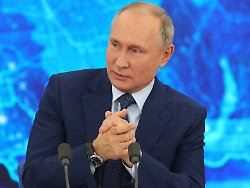Tuesday 22nd December 2020
Update
Putin issues sanctions
Russia also punishes Germans for Navalny
The dispute over the Russian Kremlin critic Navalny leads to new resentments between Moscow and the EU. President Putin appoints the ambassadors of several states and announces sanctions.
In response to EU sanctions in connection with the poison attack on Kremlin critic Alexej Navalny, Moscow has imposed entry bans on several representatives from EU countries – including Germans. This was announced on Tuesday to the Chargé d'affaires of the German Embassy in Moscow, Beate Grzeski, during a conversation in the Russian Foreign Ministry, as the German Press Agency learned from the Foreign Office in Berlin. Moscow is reacting to the sanctions imposed by the EU for poisoning Russian opposition activist Alexei Navalny. The Russian Foreign Ministry said that in response to "confrontational" EU measures it had decided to "extend the list of representatives of EU member states who are banned from entering the Russian Federation". The ministry did not publish names. It had previously called in high-ranking diplomats from Germany, France and Sweden.
The EU imposed sanctions on Russian officials in October because, in its opinion, the poison attack on Navalny could not have taken place without the knowledge and approval of Russian state agencies.
The Russian news agency Ria Novosti reported in the morning that the French ambassador and representatives of the German and Swedish embassies had arrived at the Ministry of Foreign Affairs in Moscow. Laboratories in these three countries had said that after the attack on Navalny, traces of poisoning with a chemical nerve agent from the Novichok group had been found.
Navalny phone call causes a stir
Navalny collapsed in August during a flight from within Russia. Two days later he was brought to the Charité University Hospital in Berlin, lying in a coma, for treatment. Laboratory results on Novichok poisoning were confirmed by the Organization for the Prohibition of Chemical Weapons (OPCW).
Navalny announced on Twitter on Monday that an employee of the Russian domestic intelligence service FSB had admitted to having been involved in the attack on him. Navalny also published a transcript and a recording of the more than 45-minute phone call.
In a message to Russian news agencies, the FSB described the phone call as a "provocation" that would not have been possible without the "help of foreign intelligence agencies". This should "discredit" the FSB; the recording published by Navalny was "falsified".
. (tagsToTranslate) Politics (t) Alexej Navalny (t) Russia (t) Sanctions (t) EU (t) Vladimir Putin
